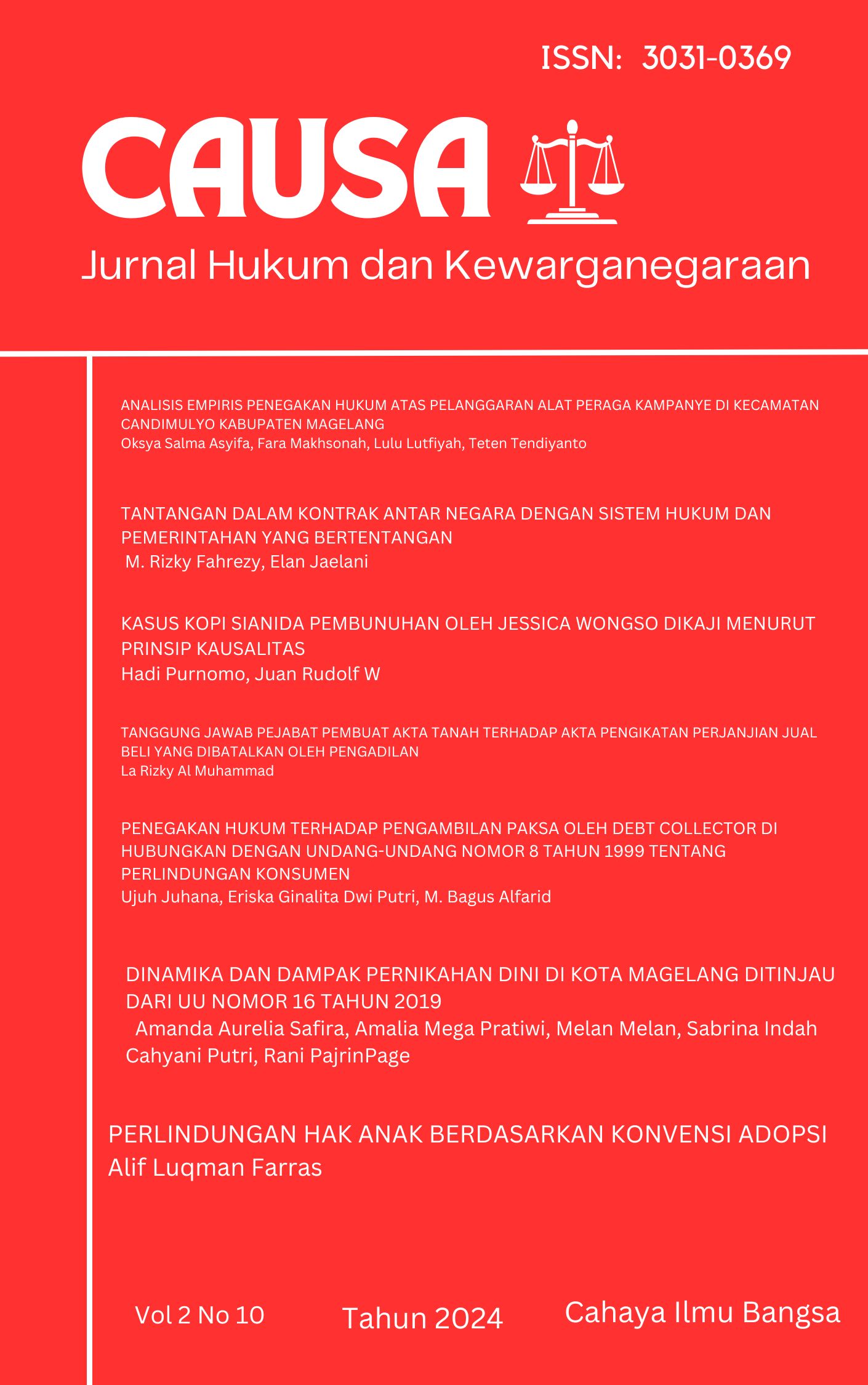DUALISME YURISDIKSI PERADILAN MILITER DAN UMUM DALAM PENANGANAN PELANGGARAN HAM OLEH TNI
- Authors
-
-
Chelsea Kairadinda Adam
Universitas Pembangunan Nasional “Veteran” JakartaAuthor -
Irwan Triadi
Author
-
- Keywords:
- Dual Jurisdiction, Military Courts, Human Rights Violations, Indonesian National Armed Forces, Legal Reform
- Abstract
-
The dual jurisdiction between military and civilian courts in handling human rights violations committed by members of the Indonesian National Armed Forces (TNI) presents significant challenges to the enforcement of justice and the rule of law. Military courts, under Law No. 31 of 1997, are authorized to prosecute TNI personnel, including in cases involving human rights violations. However, the system has been widely criticized for its lack of independence and transparency, which may lead to impunity. Although the Constitutional Court Decision No. 34/PUU-XI/2013 mandated that TNI members who commit general crimes, especially gross human rights violations, must be tried in civilian courts, this decision has not been fully implemented due to the absence of legislative amendments. This study uses a normative juridical approach and comparative analysis with military judicial systems in other countries. The findings highlight the urgent need for military court reform, stronger external oversight, and clear jurisdictional boundaries to ensure that victims' rights are upheld in a fair and transparent legal process.
- Downloads
- Published
- 2025-06-23
- Section
- Articles
How to Cite
Most read articles by the same author(s)
- Irwan Triadi, Debby Nauli Rafeyfa Simanjuntak, Novita Fitria Azzahra, Shabiya Zahra Alifa Koesnaedy, Nurul Munziyah, Devyta Ardiyaning Azz Zahra, DINAMIKA DESERSI PRAJURIT TNI DI PAPUA: ANALISIS PENYEBAB DAN DAMPAKNYA TERHADAP KEAMANAN WILAYAH , Causa: Jurnal Hukum dan Kewarganegaraan: Vol. 14 No. 2 (2025): Causa: Jurnal Hukum dan Kewarganegaraan
- Irwan Triadi, Disya Soraya Qhaira, TANGGAPAN HUKUM INTERNASIONAL TERHADAP KUDETA MILITER DI MYANMAR , Causa: Jurnal Hukum dan Kewarganegaraan: Vol. 14 No. 2 (2025): Causa: Jurnal Hukum dan Kewarganegaraan
- Lucky Priyantoro, Irwan Triadi, ANALISIS YURIDIS PENERAPAN SANKSI DISIPLIN DALAM HUKUM MILITER , Causa: Jurnal Hukum dan Kewarganegaraan: Vol. 14 No. 9 (2025): Causa: Jurnal Hukum dan Kewarganegaraan
- Rose Esperahanna Tiara Syarief, Muhammad Ikmalluhur Purnawan, Azizzah Rizqina Hidayati, Lucky Priyantoro, Syafa Fattah Mohammad, Irwan Triadi, INTEGRASI HUKUM MILITER DAN HUKUM SIPIL: SEBUAH STUDI KOMPARATIF , Causa: Jurnal Hukum dan Kewarganegaraan: Vol. 14 No. 7 (2025): Causa: Jurnal Hukum dan Kewarganegaraan
- Irwan Triadi, Nisa Resya Hamdani, Silvi Aryana Paradita, Chintya Rachma Hudaya, Najwa Aulia Rahman, URGENSI REFORMASI HUKUM MILITER DALAM MENJAMIN KEADILAN BAGI PRAJURIT DAN MASYARAKAT SIPIL , Causa: Jurnal Hukum dan Kewarganegaraan: Vol. 14 No. 2 (2025): Causa: Jurnal Hukum dan Kewarganegaraan
Similar Articles
- Lailatul Rosida, Isomuddin Isomuddin, TENTANG PERLINDUNGAN HAK ASASI MANUSIADALAM SITUASI KONFLIK BERSENJATA DI INDONESIA , Causa: Jurnal Hukum dan Kewarganegaraan: Vol. 14 No. 10 (2025): Causa: Jurnal Hukum dan Kewarganegaraan
- Dina Afriyanti, URGENSI REGULASI OTOPSI MEDIS SEBAGAI BUKTI HUKUM: PERSPEKTIF HUKUM FORENSIK, ETIKA KEDOKTERAN, DAN HAK ASASI MANUSIA , Causa: Jurnal Hukum dan Kewarganegaraan: Vol. 15 No. 8 (2025): Causa: Jurnal Hukum dan Kewarganegaraan
- Fadhilah Awaludin, Aal Lukamnul Hakim, R Djuniarsono, MODEL PENCEGAHAN DAN PENANGGULANGAN MASUKNYA NARKOTIKA DI LINGKUNGAN LEMBAGA PEMASYARAKATAN , Causa: Jurnal Hukum dan Kewarganegaraan: Vol. 14 No. 9 (2025): Causa: Jurnal Hukum dan Kewarganegaraan
- Muklas Hafizh Savero, M. Ilham Adepio, KEKUATAN HUKUM AKTA HIPOTEK KAPAL LAUT DAN IMPLIKASINYA TERHADAP PENYELESAIAN SENGKETA MARITIM DI INDONESIA , Causa: Jurnal Hukum dan Kewarganegaraan: Vol. 12 No. 8 (2025): Causa: Jurnal Hukum dan Kewarganegaraan
- Kevin Angelo Pangaribuan, Alfa Immanuel Sede, Aria Saputra, Ronaldindo Rifky Trihandoko, Zaky Prasetio Emri, Irwan Triadi, PRAJURIT AKTIF DAN BISNIS: DINAMIKA HUKUM DALAM REVISI UU TNI ANTARA LARANGAN MUTLAK DAN USULAN LIBERALISASI , Causa: Jurnal Hukum dan Kewarganegaraan: Vol. 14 No. 1 (2025): Causa: Jurnal Hukum dan Kewarganegaraan
- Dzauraz Zidnan R, Fajar Agus H, Muhammad Afif F, Eksanudin, Tegar Harbriyana P, PENEGAKAN HUKUM TERHADAP TINDAK PIDANA TERORISME DALAM PERSPEKTIF HAK ASASI MANUSIA DI INDONESIA , Causa: Jurnal Hukum dan Kewarganegaraan: Vol. 14 No. 2 (2025): Causa: Jurnal Hukum dan Kewarganegaraan
- Elsha Victoria Daniel, Gabriela Priscila Br Sitepu, HAM DI TENGAH PELURU: MENINJAU PENEGAKAN HUKUM INTERNASIONAL DALAM KONFLIK ISRAEL-PALESTINA , Causa: Jurnal Hukum dan Kewarganegaraan: Vol. 14 No. 3 (2025): Causa: Jurnal Hukum dan Kewarganegaraan
- Gunawan Widjaja, Songga Aurora Abadi, Anike Marandof, ANALISIS TERHADAP IMPLEMENTASI KEPPRES NO. 63 TAHUN 2004 DI PT FREEPORT INDONESIA , Causa: Jurnal Hukum dan Kewarganegaraan: Vol. 14 No. 12 (2025): Causa: Jurnal Hukum dan Kewarganegaraan
- Franky Bangkit Sumardi, Selamat Rapama Sihombing, Junifer Dame Panjaitan, PENDEKATAN VICTIMOLOGI TERHADAP ANAK SEBAGAI KORBAN KEKERASAN FISIK , Causa: Jurnal Hukum dan Kewarganegaraan: Vol. 14 No. 9 (2025): Causa: Jurnal Hukum dan Kewarganegaraan
- Ilham Indra Mulya, Zahratul Maulida, Fadiza Amalia Putri, Imelda Vratista, Dewi Safira, Mulyadi Mulyadi, ANALISIS PELANGGARAN KODE ETIK DAN PROFESIONALISME KEPOLISIAN DALAM KASUS PENEMBAKAN SISWA DI SEMARANG , Causa: Jurnal Hukum dan Kewarganegaraan: Vol. 13 No. 5 (2025): Causa: Jurnal Hukum dan Kewarganegaraan
You may also start an advanced similarity search for this article.

